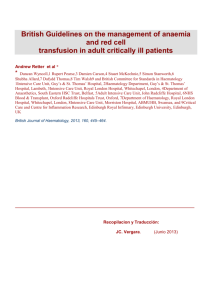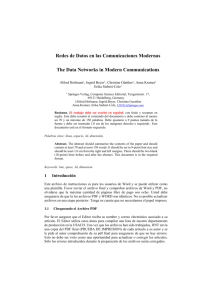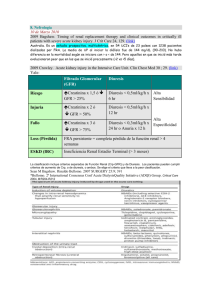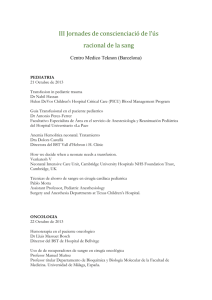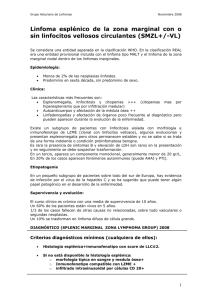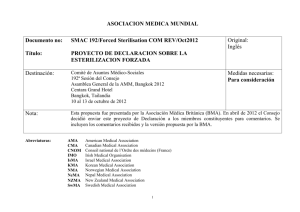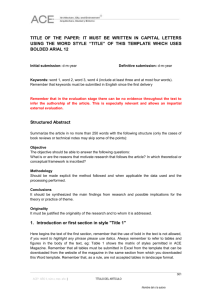MEC 201-Mental Illness COM REV-Oct2015_S
advertisement
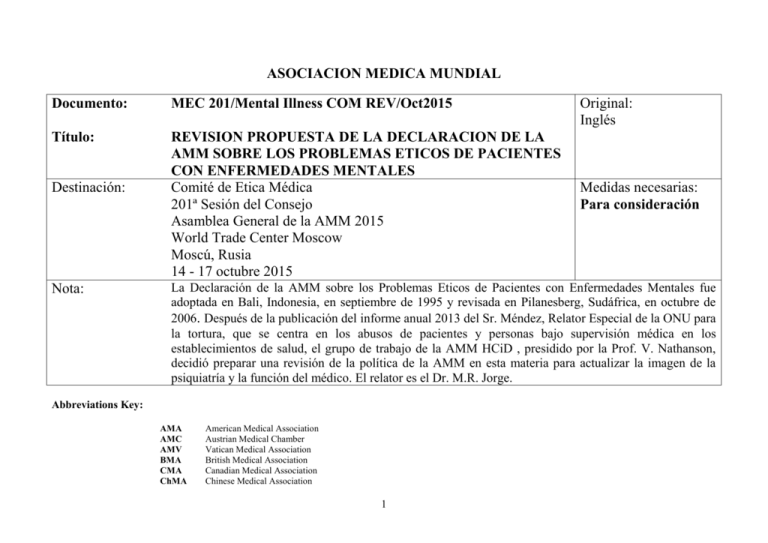
ASOCIACION MEDICA MUNDIAL Documento: MEC 201/Mental Illness COM REV/Oct2015 Título: REVISION PROPUESTA DE LA DECLARACION DE LA AMM SOBRE LOS PROBLEMAS ETICOS DE PACIENTES CON ENFERMEDADES MENTALES Comité de Etica Médica 201ª Sesión del Consejo Asamblea General de la AMM 2015 World Trade Center Moscow Moscú, Rusia 14 - 17 octubre 2015 Destinación: Nota: Original: Inglés Medidas necesarias: Para consideración La Declaración de la AMM sobre los Problemas Eticos de Pacientes con Enfermedades Mentales fue adoptada en Bali, Indonesia, en septiembre de 1995 y revisada en Pilanesberg, Sudáfrica, en octubre de 2006. Después de la publicación del informe anual 2013 del Sr. Méndez, Relator Especial de la ONU para la tortura, que se centra en los abusos de pacientes y personas bajo supervisión médica en los establecimientos de salud, el grupo de trabajo de la AMM HCiD , presidido por la Prof. V. Nathanson, decidió preparar una revisión de la política de la AMM en esta materia para actualizar la imagen de la psiquiatría y la función del médico. El relator es el Dr. M.R. Jorge. Abbreviations Key: AMA AMC AMV BMA CMA ChMA American Medical Association Austrian Medical Chamber Vatican Medical Association British Medical Association Canadian Medical Association Chinese Medical Association 1 MEC 201/Mental Illness COM REV/Oct2015 CNOM FMA GMA IMA JMA KMA LMA NMA SMA Conseil National de l’Ordre des Médecins (France) Finnish Medical Association German Medical Association Israeli Medical Association Japan Medical Association Korean Medical Association Latvian Medical Association Norwegian Medical Association Swedish Medical Association GENERAL COMMENTS It should be clarified in the statement that support to mentally ill patients can and should not only be provided by psychiatrists, but by other AMC physicians as well. Psychotherapeutic interventions must only be carried out by adequately trained doctors and psychotherapists. See specific comments below. AMV The Vatican Medical Association supports the new version of this important document. BMA The new paragraph 6 should be moved ahead of the current para 4 Para 7. The first sentence should be amended to read "The physician's primary role is relieving suffering. This must not be undermined…" Para 16. Second bullet point report to read "Call for full respect- at all times - of the dignity etc." ChMA Principles from “Ethical Principles” are too concrete, they are more like recommendations. And the recommendations lack detail and guidance. Suggest to combine “principles” and “recommendations” together. With the first sentence is principle, and the following sentences are recommendations. FMA Finnish Medical Association is in favour of the proposed amendments. GMA The GMA thanks the WMA’s Health Care in Danger workgroup for its revisions, which have, in our opinion, strengthened and enhanced this important statement. Overall, this is a good document and the Israeli Medical Association notes our support of it. We would like to add a point regarding the use of patients suffering from mental illnesses in medical research. The JMA agrees to the proposed revisions. IMA JMA 2 MEC 201/Mental Illness COM REV/Oct2015 KMA KMA supports the proposed revision in general. NMA The Norwegian Medical Association supports this revision with some minor amendments. SMA The proposed revision is well-written and we support its adoption. * Numbering will be deleted (or adjusted) when the revised text is adopted. No 1 Moved from 3 Texto propuesto: MEC 201/Mental Illness/Oct2015 INTRODUCCION Históricamente, muchas sociedades han considerado al paciente con enfermedad mental como una amenaza para los que lo rodean, en lugar de una persona que necesita ayuda y atención médica. En consecuencia, por falta de tratamiento eficaz muchos pacientes con enfermedad mental eran enviados a asilos por largos períodos o de por vida. El objetivo del encierro era evitar la conducta autodestructiva y agresiva hacia otras personas. Specific Comments Additions: bold/underlined Deletions: lined-out Comments only: [italic] Texto propuesto por el relator y president del GT - MEC 201/Mental Illness REV/Oct2015 Historically, many societies have regarded patients with mental illness as a threat to those around them rather than as people in need of support and care. Therefore, In the absence of effective treatment, to prevent self-destructive behaviour or harm to others, many patients persons with mental illness were confined to asylums for all or part of their lives. The aim of such confinement in these cases was to prevent behaviour that was self-destructive or aggressive toward others. [AMA] Históricamente, muchas sociedades han considerado al paciente con enfermedad mental como una amenaza para los que lo rodean, en lugar de una persona que necesita ayuda y atención médica. Por falta de tratamiento eficaz, para evitar la conducta autodestructiva y agresiva hacia otras personas, muchas personas con enfermedad mental eran enviadas a asilos por largos períodos o de por vida. En la actualidad, el progreso en el tratamiento psiquiátrico permite una mejor atención de los pacientes con enfermedad mental. Medicamentos eficaces e intervenciones psicosociales pueden dar resultados que van de un completo restablecimiento a Move paragraph 3 with amendments: Today, progress in psychiatric treatment allows for better care of patients with mental illness. Efficacious drugs and psychosocial interventions offer outcomes ranging from complete recovery to remission for varying lengths of time [AMA] 3 MEC 201/Mental Illness COM REV/Oct2015 2 La adopción en 2006 de la Convención de la ONU sobre los Derechos de las Personas con Discapacidad constituyó un gran paso para considerar a las personas con discapacidad como miembros plenos e iguales en la sociedad. Es el primer tratado de derechos humanos completo del siglo 21. Su objetivo es promover, proteger y reforzar los derechos humanos y la dignidad de todas las personas con discapacidad, incluidas las que tienen deficiencia mental. 3 At the present time, progress in psychiatric treatment allows for better care of patients with mental illness. Efficacious drugs and psychosocial interventions can result in outcomes ranging from complete recovery to temporary remissions of varying lengths for patients whose conditions are more serious. recuperaciones de duración variable. La adopción en 2006 de la …It is the This first comprehensive human rights st treaty of the 21 century. It aims to promote, protect Convención de la ONU sobre los Derechos de las Personas con and reinforce the human rights and dignity of all Discapacidad constituyó un gran persons with disabilities, including those person paso para considerarlas como with mental impairments. [AMA] miembros de la sociedad con los mismos derechos que cualquiera. The adoption in 2006 of the United Nations Es el primer tratado de derechos Convention on the Rights of Persons with humanos completo del siglo 21. Su Disabilities constituted a major step towards objetivo es promover, proteger y viewing them persons with disabilities as full and reforzar los derechos humanos y la equal members of society with the same rights as dignidad de todas las personas con everyone else. It is the first comprehensive human st rights treaty of the 21 century. It aims to promote, discapacidad, incluidas las que tienen deficiencia mental. protect and reinforce the human rights and dignity of all persons with disabilities, including those with mental impairments. [CNOM] Move after paragraph 1 with amendments. [AMA] At the present time, progress in psychiatric therapy treatment allows for better care of patients with mental illness. Efficacious drugs and other treatments psychosocial, psychosomatic and psychotherapeutic interventions can result in patient outcomes ranging from complete alleviation of symptoms to long recovery to temporary remissions of varying lengths for patients whose conditions are more serious. [AMC] At the present time, progress in psychiatric treatment allows for better care of patients with 4 Cambiado a después del párrafo 1 con enmiendas. MEC 201/Mental Illness COM REV/Oct2015 mental illness. Efficacious drugs and psychosocial interventions can result in complete recovery to temporary or remissions of varying lengths for patients whose conditions are more serious. [CNOM] RIGHT TO HEALTH CARE [AMA] New [AMA: Added to clearly identify a key issue addressed by this statement] Move ahead of paragraph 4. [BMA] Moved from 6 4 Los pacientes con enfermedad mental deben considerarse, tratarse y poder tener el mismo acceso a la atención médica que cualquier otro paciente. Por lo tanto, el psiquiatra o cualquier otro profesional de salud mental debe derivar estos pacientes a otros médicos cuando sea necesario. Those Persons [AMA] with major mental illnesses and those with learning disabilities disability [CMA] have the same right to preventive services and interventions to promote health as are more likely to live unhealthy lifestyles than others members of the in their communityies, for which they often have greater need because they are more likely to live unhealthy lifestyles. They must be offered the same opportunities for health promotion interventions (such as smoking cessation) and treatment of physical illnesses as any other person. [AMA] Move paragraph to “Ethical Principles” [ChMA] Los que tienen enfermedades mentales importantes y los que tienen discapacidad para aprender tienen el mismo derecho a servicios e intervenciones preventivas que los otros miembros de la comunidad, porque tienen a menudo más necesidades, ya que es más probable que tengan estilos de vida no saludables. Los pacientes con morbilidad psiquiátrica también pueden sufrir enfermedades no psiquiátricas. Las Patients with mental illness should be viewed, treated and enabled to have the same access to care personas con enfermedad mental as any other medical patient. However, this is often tienen el mismo derecho a la not enough since patients with mental illnesses may atención médica que cualquier otro paciente. El psiquiatra y el not know when to seek treatment for somatic profesional de salud que presta problems. Therefore, the physician psychiatrist or any other mental health professional should actively servicios de salud mental debe 5 MEC 201/Mental Illness COM REV/Oct2015 refer these patients to other physicians when necessary. [NMA] Patients Persons with mental illness should be viewed, treated and granted enabled to have the same right access to health care as any other medical patient. However, this is often not enough since patients with mental illnesses may not know when to seek treatment for somatic problems. Therefore, the physician Psychiatrists or any and health care professionals who provide other mental health professional services should actively refer these patients to other appropriate professionals when patients need medical care.physicians when necessary. Health care professionals should never decline to provide needed medical care solely because the patient has a mental illness. [AMA] Patients with mental illness should be viewed, considered and enabled to have the same access to care treated the same as any other medical patient and should have the same access to health care. Therefore, the psychiatrist or any other mental health professional should actively refer these patients to other physicians when necessary. [CNOM] Add in at the beginning: Patients with psychiatric morbidity may also experience non- psychiatric illness. [BMA] [AMA: the last sentence seems to be a necessary 6 derivar estos pacientes a otros profesionales apropiados cuando necesiten atención médica. Los profesionales de salud nunca deben declinar la prestación de la atención necesaria únicamente porque el paciente tiene una enfermedad mental. MEC 201/Mental Illness COM REV/Oct2015 corollary to the duty to refer.] [NMA: In many countries people with mental health problems are treated in general practice. Also general practitioners must refer these patients to other physicians or specialists. We would therefore prefer to keep physician in the last sentence and strike out “psychiatrist” and “any other”.] [ChMA: This is more a principle. Suggest this article be moved to the part of “Ethical Principles”] [AMC: A definition of what is meant by “other mental health professionals” is required from our point of view]. 5 El médico tiene las mismas obligaciones con su paciente con enfermedad mental que como con cualquier otro paciente. Move paragraph to “Ethical Principles” [ChMA] Replace by: Physicians have the same obligations to all patients, including patients with mental illness. Psychiatrists or other physicians who treat patients with mental illness must adhere to the same ethical standards as any physician. [AMA] El médico tiene las mismas obligaciones con todos los pacientes, incluidos los que tienen una enfermedad mental. Los psiquiatras y otros médicos que tratan a pacientes con enfermedades mentales deben respetar las mismas normas éticas como cualquier otro médico. [ChMA: Same as above. Move to the part of “Ethical Principles”] 6 Los que tienen enfermedades mentales Those Persons [AMA] with major mental illnesses importantes y los que tienen discapacidad para and those with learning disabilities disability aprender es más probable que tengan estilos de [CMA] have the same right to preventive 7 Cambiado a antes del párrafo 4 MEC 201/Mental Illness COM REV/Oct2015 vida no saludables que otras personas en sus comunidades. Se les deben ofrecer las mismas oportunidades de intervenciones de promoción de la salud (como cesación del tabaquismo) y tratamiento de enfermedades físicas al igual que cualquier otra persona. . services and interventions to promote health as are more likely to live unhealthy lifestyles than others members of the in their communityies, for which they often have greater need because they are more likely to live unhealthy lifestyles. They must be offered the same opportunities for health promotion interventions (such as smoking cessation) and treatment of physical illnesses as any other person. [AMA] Those with major mental illnesses and those with learning disability are more likely to live unhealthy lifestyles than others in their communities. They must be offered the same opportunities for preventative health measures health promotion interventions (such as smoking cessation) and treatment of physical illnesses as any other person.[CNOM] [BMA: The new para 6 should be moved ahead of the current para 4] [AMC: This claims needs to be supported by evidence in scientific literature] 7 Las funciones principales del médico como sanador de pacientes no debe verse afectada al ser agente de la sociedad, excepto en casos de peligro para sí mismo o para otros. The physician's primary role as healer therapist of patients must not be undermined by serving as the agent of the greater society, except in instances of danger to the public himself/ herself or to others due to mental disorder. [NMA] The physician's primary role as healer of patients obligation is to the patient and physicians must 8 La principal obligación del médico es para con el paciente y no ser agente de la sociedad, excepto cuando un paciente representa un claro peligro para sí mismo o para otros debido a su enfermedad mental. MEC 201/Mental Illness COM REV/Oct2015 not compromise their role as healers by serving as the agents of society, must not be undermined by serving as the agent of the greater society, except in circumstances when a patient presents a clear danger to the himself or others. instances of danger to the public himself/ herself or to others. [AMA] The physician's primary role as healer of patients must not be undermined tainted by his or her role in serving as the agent of the greater society, except in instances of danger to himself/ herself or to others. [CNOM] The physician's primary role is relieving suffering as healer of patient. This must not be undermined by serving as the agent of the greater society, except in instances of danger to himself/ herself or to others. [BMA] [NMA: In Norway healer is associated with alternative treatment. We would prefer therapist. We also suggest to add “due to mental disorder” to make it more precise.] 8 Las mismas obligaciones y limitaciones se aplican a los psiquiatras u otros médicos que traten a pacientes con enfermedades mentales. Remove paragraph [NMA + AMA + CNOM] Move to “Recommendations”[ChMA] The same ethical obligations and limitations would apply to psychiatrists or other physicians who are treating patients with mental illness. [SMA] 9 MEC 201/Mental Illness COM REV/Oct2015 [NMA: It seems like there is some overlap between item 5 and 8. We suggest deleting item 8 and keeping item 5.] [AMA: This concept is incorporated in parag. 6] The normal human behaviour as grief, sadness and other emotions that are reactions to events in human life should not be medicalized by psychiatrists or other physicians when persons are looking for support and reassurance. [LMA] New 9 PRINCIPIOS ETICOS PHYSICIANS’ ETHICAL PRINCIPLES RESPONSIBILITIES [AMA] RESPONSABILIDADES ETICAS DEL MEDICO El estigma y la discriminación asociados a la psiquiatría y a los enfermos mentales debe ser combatida. Este estigma y discriminación a menudo desalientan a las personas que necesitan atención médica, lo que agrava su situación y los deja en riesgo de daño emocional o físico. All efforts should be made to eliminate the The stigma and discrimination associated with psychiatry and the mentally ill should be fought. [CMA] El estigma y la discriminación asociados a la psiquiatría y a los enfermos mentales debe ser eliminada. Este estigma y discriminación puede desalentar a las personas que necesitan atención médica, lo que agrava su situación y los deja en riesgo de daño emocional o físico. The stigma and discrimination associated with psychiatry and the mentally ill should be fought eliminated [AMC]… Physicians have a responsibility to oppose the stigma and discrimination associated with mental illness and psychiatric care and to remove barriers that discourage people in need from seeking or receiving appropriate care. The stigma and discrimination associated with psychiatry and the mentally ill should be fought. Stigma and discrimination often discourages people in need from seeking psychiatric medical care, 10 MEC 201/Mental Illness COM REV/Oct2015 thereby aggravating their situation and placing them at risk of emotional or physical harm. [AMA] The stigma and discrimination associated with psychiatry and the mentally ill should be eliminated tackled. Stigma Stigmatisation and discrimination often discourages people in need from seeking medical care, thereby aggravating their situation and placing them at risk of emotional or physical harm having a negative effect on their physical and psychological state. [CNOM] …Stigma and discrimination often discourages may discourage people in need from seeking medical care, thereby aggravating their situation and placing them at risk of emotional or physical harm. [BMA] Move the second sentence to “Preamble”[ChMA] Moved from 11 Move paragraph 11 with amendments Physicians have a responsibility to respect the autonomy of all patients. When patients who are being treated for mental illness have decisionmaking capacity, they have the same right to make decisions about their care as any other patient. Because decision-making capacity is specific to the decision to be made and can vary over time, including as a result of treatment, physicians must continually evaluate the patient’s capacity. When a patient lacks decision-making capacity, physicians should seek consent from an appropriate surrogate in accordance with applicable law. [AMA] 11 Los médicos tienen la responsabilidad de respetar la autonomía de todos los pacientes. Cuando los pacientes que son tratados por enfermedad mental tienen la capacidad de tomar decisiones, tienen el mismo derecho de tomar decisiones sobre su atención como cualquier otro paciente. Puesto que la capacidad para tomar decisiones es específica a la decisión que se tomará y puede cambiar en el tiempo, incluso como resultado de un tratamiento, los MEC 201/Mental Illness COM REV/Oct2015 [AMA: This needs to be stated more clearly, especially to distinguish clinical determination of capacity to participate in treatment from legal determination of competence, which can cover a much wider range of decision situations.] 10 El médico aspira a una relación terapéutica fundada en la confianza mutua. Debe informar al paciente la naturaleza de su condición, los procedimientos terapéuticos estándares, (incluidas posibles alternativas y el riesgo de cada una) y el resultado esperado. The physician aspires for a therapeutic relationship between physician and patient is founded on mutual trust, and physicians have a responsibility to seek patients’ informed consent to treatment, including patients who are being treated for mental illness. . He/she Physicians should inform the all patients of the nature of the patient's their the nature of the psychiatric or medical condition, the standard therapeutic procedures (including possible alternatives and the risk of each), and the expected benefits, outcomes, and risks of treatment alternatives. for the available therapeutic choices. [AMA] The physician aspires for a therapeutic relationship founded on mutual trust. He/she should inform the patient of the nature of their condition, the standard therapeutic procedures (including possible alternatives and the risk of each), and the expected outcomes. A doctor owes to any patient that he examines, advises and treats, honest, clear and appropriate information about his state of health and the investigations and treatment proposed. 12 médicos deben evaluar continuamente la capacidad del paciente. Cuando un paciente no tiene la capacidad de tomar decisiones, los médicos deben obtener el consentimiento de un representante apropiado, conforme a las leyes vigentes. La relación terapéutica fundada entre médico y paciente está fundada en la confianza mutua. El médico tiene la responsabilidad de obtener el consentimiento informado del paciente para el tratamiento, incluidos los pacientes que son tratados por enfermedad mental. El médico debe informar a todos los paciente la naturaleza del estado médico o psiquiátrico y los beneficios esperados, resultados y riesgos de las alternativas de tratamiento. MEC 201/Mental Illness COM REV/Oct2015 Throughout the patient’s illness, the doctor should tailor his explanations to the patient’s personality and do his or her best to ensure that they are understood. However, a doctor must respect a patient’s request not to be informed of a diagnosis or a prognosis, unless others are in danger of contamination. Great care must be taken in revealing a terminal prognosis, but persons close the patient should normally be informed, unless the patient has already indicated that he does not wish them to be informed or has designated third parties to whom the information should be given. [CNOM] 11 Si no existe el fallo legal de incapacitado, los pacientes psiquiátricos deben ser tratados como si fueran capacitados legalmente. Se debe respetar su opinión en las áreas donde puede tomar decisiones legalmente, a menos que represente un serio riesgo para ellos o para otros. Un paciente con enfermedad mental incapaz de ser autónomo legalmente debe ser tratado como cualquier otro paciente que está temporal o permanentemente incapacitado desde el punto de vista legal. Si un paciente no puede tomar decisiones sobre su atención médica, se debe obtener el consentimiento de un representante, conforme a las leyes vigentes. Como la incapacidad varía según la decisión y a lo largo del tiempo, en sí o como resultado del tratamiento, la autonomía del paciente debe ser evaluada constantemente y considerada. Remove paragraph [AMA] In the absence of legally adjudicated incompetence, psychiatric patients must be dealt with as though they are legally competent. The patient's judgment wishes should be respected in areas where he/she is legally capable of making decisions, unless they present a risk of serious harm to themselves or others. A patient with mental illness who is incapable of legally exercising his/her autonomy should be treated like any other patient who is temporarily or permanently legally incompetent. If the patient lacks the capacity to make a decision as to his/her medical care, surrogate consent should be sought from a representative in accordance with applicable law. As incompetence varies from with decision to decision and along the time, by itself or as a result of treatment, a patients’ autonomy needs to be constantly evaluated and taken into 13 Cambiado a antes del párrafo 10 con enmiendas. MEC 201/Mental Illness COM REV/Oct2015 consideration. [CNOM] …If the patient lacks the capacity to make a decision as to his/her medical care, surrogate consent should be sought from a [IMA] representative in accordance with applicable law. Where advance directives are available, they should be consulted. [CMA] As incompetence varies from decision to decision and along the may change over [CMA] / over [IMA] time, by itself or as a result of treatment, patients’ autonomy needs to be constantly evaluated and taken in into consideration. [IMA & CMA] …As incompetence varies from decision to decision and along the over time, by itself or as a result of treatment, patients’ autonomy needs to be constantly evaluated and taken in consideration. [SMA] Move from 13 Move from parag. 13 with amendments: Physicians should always base treatment recommendations on their best professional judgment and treat all patients with solicitude and respect, regardless of the setting of care. Physicians who practice in mental health facilities, the military, or correctional institutions may have concurrent responsibilities to society that create conflicts with the physician’s primary obligation to the patient. In such situations, physicians should disclose the conflict of interest to minimize possible feelings of betrayal on the patient’s part. [AMA] 14 Los médicos siempre deben basar las recomendaciones de tratamiento en su mejor opinión profesional y tratar a todos los pacientes con diligencia y respeto, independientemente del lugar de la atención. El médico que trabaja en una institución de salud mental, el ejército o una cárcel, puede tener responsabilidades simultáneas ante la sociedad que crea conflictos con su principal obligación ante el paciente. En estas situaciones, el MEC 201/Mental Illness COM REV/Oct2015 médico debe revelar el conflicto de intereses, a fin de disminuir al mínimo los posibles sentimientos de traición de parte del paciente. 12 La hospitalización forzada de pacientes psiquiátricos evoca una controversia ética. Aunque la legislación sobre la hospitalización y tratamiento forzadas varía en el mundo, por lo general se reconoce que esta decisión de tratamiento requiere lo siguiente: a) grave trastorno mental que impide que la persona tome sus propias decisiones sobre el tratamiento o b) la posibilidad de que el paciente pueda lesionarse o lesionar a otros. Los médicos deben considerar la hospitalización obligada como excepcional y utilizar este recurso sólo cuando sea indicada de manera científica y médicamente necesario y por el período más breve posible, según las circunstancias. Cuando sea posible y conforme a la legislación local, los médicos deben incluir un abogado para los derechos de ese paciente en el proceso de decisión. Move paragraph to “Recommendation” [ChMA] El tratamiento y la hospitalización forzada de personas con Involuntary treatment or hospitalization of enfermedades mentales es psychiatric patients evokes persons with mental éticamente controversial. Aunque illness is ethically controversial. While laws la legislación sobre la regarding involuntary hospitalization and treatment hospitalización y el tratamiento vary worldwide, it is generally acknowledged that forzadas varía en el mundo, por lo this treatment decision without the patient’s general se reconoce que esta informed consent or against the patient’s will is decisión de tratamiento sin el ethically justifiable only when: requires the consentimiento informado del following: (a) a severe mental disorder that prevents paciente o contra su voluntad es the individual from making his/her own justificable éticamente sólo cuando: autonomous treatment decisions; and/or (b) There a) un grave trastorno mental impide is significant the likelihood that the patient may que la persona tome sus propias harm him/her self or others. Physicians should decisiones sobre el tratamiento o b) consider compulsory Involuntary treatment or la alta posibilidad de que el hospitalization should be exceptional and paciente pueda lesionarse o lesionar physicians should utilize it only when there is a otros. El tratamiento y la good scientific evidence that it is medically hospitalización forzada deben ser appropriate and necessary and should ensure excepcionales y los médicos deben that the individual is hospitalized for the shortest utilizar este recurso sólo cuando duration feasible under the circumstances. exista gran evidencia de que es scientifically indicated and medically necessary, médicamente apropiado y necesario and for the shortest duration feasible under the y deben asegurarse de que la circumstances. Wherever possible and in persona sea hospitalizada por el accordance with local laws, physicians should período más breve posible, según include an advocate for the rights of that patient las circunstancias. Cuando sea in the decision process. [AMA] posible y conforme a la legislación 15 MEC 201/Mental Illness COM REV/Oct2015 Involuntary hospitalization of psychiatric patients evokes ethical controversy. While laws regarding involuntary hospitalization and treatment vary worldwide, it is generally acknowledged that this treatment decision requires the following: (a) a severe mental disorder that prevents the individual from giving consent to treatment making his/her own treatment decisions; and/or (b) the likelihood that the patient may harm him/her self or others. Physicians should consider compulsory hospitalization to be exceptional and should utilize it only when it is considered scientifically indicated and medically necessary and justified from a medical point of view, and for the shortest duration feasible possible under considering the circumstances. Wherever possible and in accordance with local laws, physicians should include an advocate for the rights of that patient in the decision process. [CNOM] ….. Physicians should consider compulsory hospitalization to be exceptional and should utilize it only when it is scientifically indicated and medically necessary, and for the shortest duration feasible under the circumstances. Wherever possible and in accordance with local laws, physicians should include an advocate for the rights of that patient in the decision process. [NMA] [AMA: The reference to law is ambiguous. Perhaps the intended meaning is that physicians should comply with legal requirements when there 16 local, los médicos deben incluir un abogado para los derechos de ese paciente en el proceso de decisión. MEC 201/Mental Illness COM REV/Oct2015 is applicable law about the role of the advocate--how to choose an appropriate advocate, what authority the advocate has, etc.] [NMA: We think it is not necessary to have “scientifically indicated” as an extra criterion for compulsory hospitalisation. A medical decision should be based on science and should therefore be sufficient for compulsory hospitalisation.] 13 Cada médico debe ofrecer al paciente la mejor terapia disponible, según sus conocimientos, y lo debe tratar con la preocupación y respeto que corresponde a todos los seres humanos. El médico que trabaja en una institución psiquiátrica, el ejército o una cárcel, se puede ver enfrentado a un conflicto entre sus responsabilidades hacia la sociedad y sus responsabilidades con el paciente. La primera lealtad y deber del médico debe ser hacia el paciente. El médico debe asegurarse que se informe al paciente del conflicto de intereses, a fin de disminuir al mínimo los sentimientos de traición y debe ofrecerle la oportunidad de comprender las medidas ordenadas por las autoridades legales. Move under parag. 11 with amendments [AMA] Every physician should offer to the patient the best available therapy according to his/her knowledge, and should treat the patient with the solicitude and respect due to all human beings. The physician practising in a psychiatric institution, the military or a prison can be faced with a conflict between his/her responsibilities to society and the his/her responsibilities to the patient [CMA] Every physician should offer to the patient quality care based on scientific facts the best available therapy according to his/her knowledge, and should treat the patient with the solicitude and respect due to all human beings. The physician practising in a psychiatric institution, the military or a prison can be faced with a conflict between his/her responsibilities to society and the responsibilities to the patient. The physician's primary loyalty priority and duty must be to the patient's best interest. The physician should ensure that the patient is made aware of the any conflict of interest in order to 17 MEC 201/Mental Illness COM REV/Oct2015 minimize any loss of confidence for the patient feelings of betrayal, and should offer the patient the opportunity to understand measures mandated by legal authority. [CNOM] [ChMA: The last sentence is not clear. Also need attention that it is usually not possible because some mental health patient can’t understand] 14 New Se debe salvaguardar el secreto y privacidad de todos los pacientes. Cuando lo exija la ley, el médico revelará sólo la información específica requerida y solamente a la entidad que tiene autoridad legal para hacer dicha solicitud o demanda. Los bancos de datos que permiten el acceso o la transferencia de información de una autoridad a otra pueden ser utilizados, siempre que se respete la confidencialidad y que dicho acceso o transferencia cumpla plenamente con la ley vigente.. Physicians must protect Tthe confidentiality and privacy of all patients should be safeguarded. When legally required to disclose patient information required by law, the physician should disclose only the required relevant minimum relevant information necessary material and should disclose such material and only to an entity the entity having legal authority legally authorized to make such a to request or require the information. or demand. When Data banks databanks that allow access to or transfer of information from one authority to another may be used provided that medical confidentiality must be is respected and such access or transfer is fully compliant must comply fully with applicable law. [AMA] Los médicos deben proteger la confidencialidad y la privacidad de todos los pacientes debe ser salvaguardada. Cuando la ley exija revelar información del paciente, el médico debe revelar sólo la información mínima pertinente necesaria y solamente a la entidad que tiene autoridad legal para pedir la información. Cuando los bancos de datos permiten el acceso o la transferencia de información de una autoridad a otra se debe respetar la confidencialidad y dicho acceso o transferencia debe cumplir plenamente con la ley vigente. Individuals with psychiatric illness have the right to participate in research in order to further the understanding of mental illness and to advance available treatment options. In such case, research should be conducted at the highest standards of informed consent, moral integrity and respect for human dignity. It is critical that La participación de personas con enfermedades psiquiátricas en investigación debe estar en completo acuerdo con las recomendaciones de la Declaración de Helsinki. 18 MEC 201/Mental Illness COM REV/Oct2015 the boundary between research and clinical care is made clear at all times with any conflict of interest potentially influencing professional integrity being declared. [IMA] 15 El médico nunca debe hacer uso de su posibilidades profesionales para violar la dignidad o los derechos humanos de ningún individuo o grupo y nunca debe permitir que los deseos personales, necesidades, sentimientos, prejuicios o creencias interfieran con el tratamiento. Tampoco el médico debe aprovechar su posición profesional o la vulnerabilidad de un paciente para abusar de su autoridad A pPhysicians must never use their his/her professional position to violate the dignity or human rights of any individual or group, and should never allow their his/her personal desires, needs, feelings, prejudices or beliefs to interfere with the a patient’s treatment. Neither should a physician take advantage of his/her professional position or the vulnerability of a patient to abuse his/her authority. Physicians must never abuse their authority or take advantage of a patient’s vulnerability. [AMA] A physician must never use his/her professional position to violate the dignity or human rights of any individual or group, and should never allow his/her personal desires, needs, feelings, prejudices or beliefs to interfere with the treatment. [CMA]…. A physician must never use his/her professional position to violate the dignity or human rights of any individual or group, and should never allow his/her personal opinions desires, needs, feelings, prejudices or beliefs to interfere with the treatment. Neither should a physician take advantage of his/her professional position or the vulnerability of a patient to abuse his/her authority position. [CNOM] 19 El médico nunca debe hacer uso de su posibilidades profesionales para violar la dignidad o los derechos humanos de ningún individuo o grupo y nunca debe permitir que los deseos personales, necesidades, sentimientos, prejuicios o creencias interfieran con el tratamiento del paciente. El médico nunca debe abusar de su autoridad o aprovecharse de la vulnerabilidad de un paciente. MEC 201/Mental Illness COM REV/Oct2015 Recomendaciones 16 Se insta a la Asociación Médica Mundial y a las asociaciones médicas nacionales a: 16.1 Publicar esta Declaración y utilizarla como base para reafirmar las fundaciones éticas del tratamiento de pacientes con enfermedades mentales Al hacerlo, llamar al total respeto – en todo momento – de la dignidad y los derechos humanos de los pacientes con enfermedades mentales. 16.2 RECOMMENDATIONS [IMA & AMA] Publicize this Statement and use it as a basis for affirming affirm the ethical foundations for treatment of patients with mental illness; [AMA] While doing so, call for the full respect – at any time – of Insist that at all times the dignity and human rights of patients with mental illness be respected; [AMA] Recomendaciones Se insta a la Asociación Médica Mundial y a las asociaciones médicas nacionales a: Publicar esta Declaración y reafirmar las fundaciones éticas del tratamiento de pacientes con enfermedades mentales Al hacerlo, llamar al total respeto – en todo momento – de la dignidad y los derechos humanos de los pacientes con enfermedades mentales. While doing so, call for the full respect [BMA] – at any time all times – of the dignity and human rights of patients with mental illness; [CNOM + BMA] 16.3 Crear conciencia de la función clave del médico en apoyar a los pacientes con enfermedades mentales, con el fin de promover una relación privilegiada en base a la confianza, el profesionalismo y la confidencialidad. Raise awareness on of [CMA] the key role played by physicians in support treatment of patients with mental illness, aiming to promote a privileged relationship based on trust, professionalism and confidentiality; [AMC] Raise awareness on the key role played by physicians in of physicians’ responsibilities to support of the well-being and rights of patients with mental illness, aiming to promote a privileged relationship based on trust, professionalism and confidentiality; [AMA] Raise awareness on the key role played by physicians and health professionals working to in 20 Crear conciencia de la responsabilidad del médico en apoyar el bienestar y los derechos de los pacientes con enfermedades mentales. MEC 201/Mental Illness COM REV/Oct2015 support of patients with mental illness, aiming to promote a privileged relationship based on trust, professionalism and confidentiality; [CNOM] 16.4 Promover el reconocimiento de la relación privilegiada entre médico y paciente, en base a la confianza, el profesionalismo y la confidencialidad. Advocate for appropriate resources and capacities Abogar por obtener recursos for care facilities – including psychiatric institutions apropiados para satisfacer las – dedicated to meet the needs of persons patients necesidades de las personas con with mental illness. [AMA] enfermedades mentales. Promote recognition of the privileged relationship between patient and physician based on trust, professionalism and confidentiality. [AMA] New Abogar por obtener recursos y capacidades apropiados para los establecimientos de salud – incluidas las instituciones psiquiátricas – dedicados a los pacientes con enfermedades mentales. 14.09.2015 21
